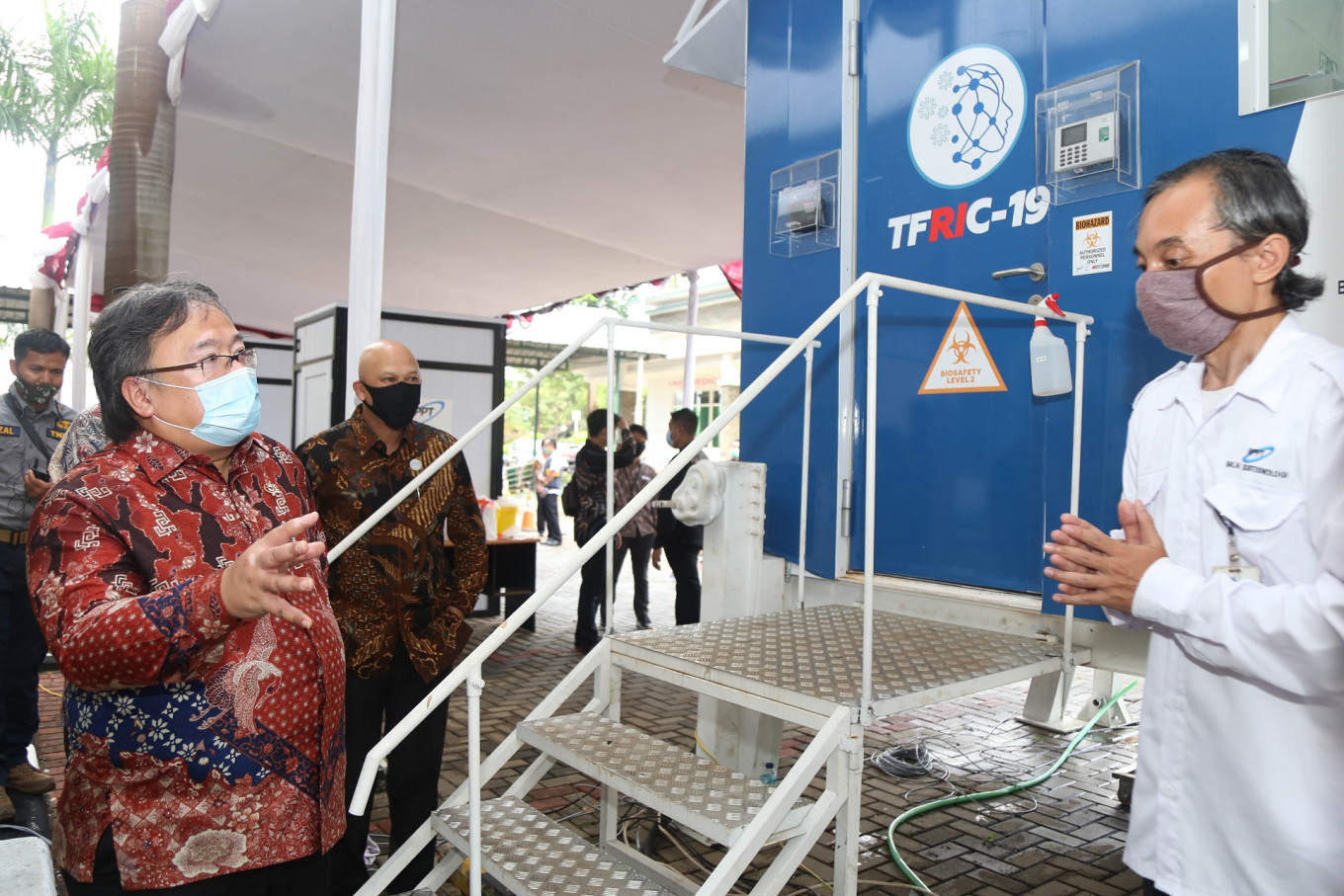In need of innovation: Ma’ruf calls on researchers to take country forward
Change Size

T
he 25th National Technology Awakening Day on Tuesday was a call to researchers to spur innovation so that the country could solve the problems and challenges it faced independently, Vice President Ma’ruf Amin has said.
Ma’ruf cited data from the United Nations Educational, Scientific and Cultural Organization (UNESCO) that show Indonesia only has 89 researchers for every 1 million people, far less than Vietnam with 682 researchers per 1 million population, despite allocating more money than the fellow Southeast Asian to research and development.
He said only a few innovators had been able to commercialize their innovations.
“I hope that this year’s commemoration can inspire researchers and other innovators to create more homemade innovations, especially in preventing and handling the COVID-19 pandemic,” he said.
“For those who haven’t succeeded, do not stop innovating and keep trying, I am certain that one day you will succeed in finding new innovations that are beneficial to the nation,” he added.
This year marks 25 years since Indonesia’s homemade N-250 Gatotkaca turboprop aircraft made its first flight in Bandung, West Java, on Aug. 10, 1995, which has since been remembered as National Technology Awakening Day.
Innovation is essential for Indonesia to improve its global competitiveness and achieve its dream of becoming a developed country.
To support that vision, Research and Technology Minister Bambang Brodjonegoro launched on Monday an e-book that outlines national strategies related to the use of artificial intelligence (AI) and an e-catalog to facilitate the marketing of innovations and hybrid products.
Alongside Villages, Disadvantaged Regions and Transmigration Minister Abdul Halim Iskandar, he also launched the 100 Desa Berinovasi (100 Innovating Villages) program, which aims to improve rural economies through environmentally sustainable innovation.
For example, a remote village in North Tamalia, Gorontalo, has been working with a local university to build water turbines to generate electricity to address the village’s lack of access to power.
The research ministry has also been developing a machine to convert palm oil into fuel, a salt production plant in Gresik, East Java, that uses Internet of Things (IoT), as well as high-tech military and transportation airplanes, among other inventions.
In late March, the ministry formed a consortium to develop ventilators, personal protection equipment, rapid antibody test kits, convalescent plasma treatment and vaccines to bolster the fight against COVID-19. By May, the research consortium had launched nine such products.
“We are all determined to create an independent, advanced and prosperous Indonesia. Let us successfully reform Indonesia from a natural resource-based country to an innovation-based country,” Bambang said.
Despite these signs of progress, Indonesia still lags behind, as shown in recent indexes.
The Global Innovation Index shows that innovation in Indonesia has stagnated in the past seven years, with Indonesia ranking 85th in the 2019 index – the lowest of all G20 nations. It also ranked second-lowest among its ASEAN peers last year.
Indonesia’s ranking in the World Economic Forum’s global competitiveness index also dropped five places in 2019 to 50th out of 141 economies as a result of a stagnating “innovation ecosystem” and stagnating human capital development, among other variables.
To spur innovation, Indonesian Young Academy of Science (ALMI) secretary-general Berry Juliandi urged the government to fund more basic research, which he said had contributed to much of the innovation successes in other countries.
Indonesia currently puts most of its funding toward applied research in order to get instant results in the form of products or other applications, he said.
Authorities should allow industry players to invest in applied research by making use of “super tax deductions”, he said. Although the government should also provide relief from sanctions should the companies be found to have previously not paid taxes during an audit, which he said had discouraged companies from applying for the tax initiative.
The ministry, Berry said, should also revise laws that have stymied innovation, such as a ministerial regulation that obliges researchers to downstream their results or requires them to have their research published in scientific journals.
“Indonesia has immense potential to develop innovations, but bad regulations and programs have prevented this,” he said.









